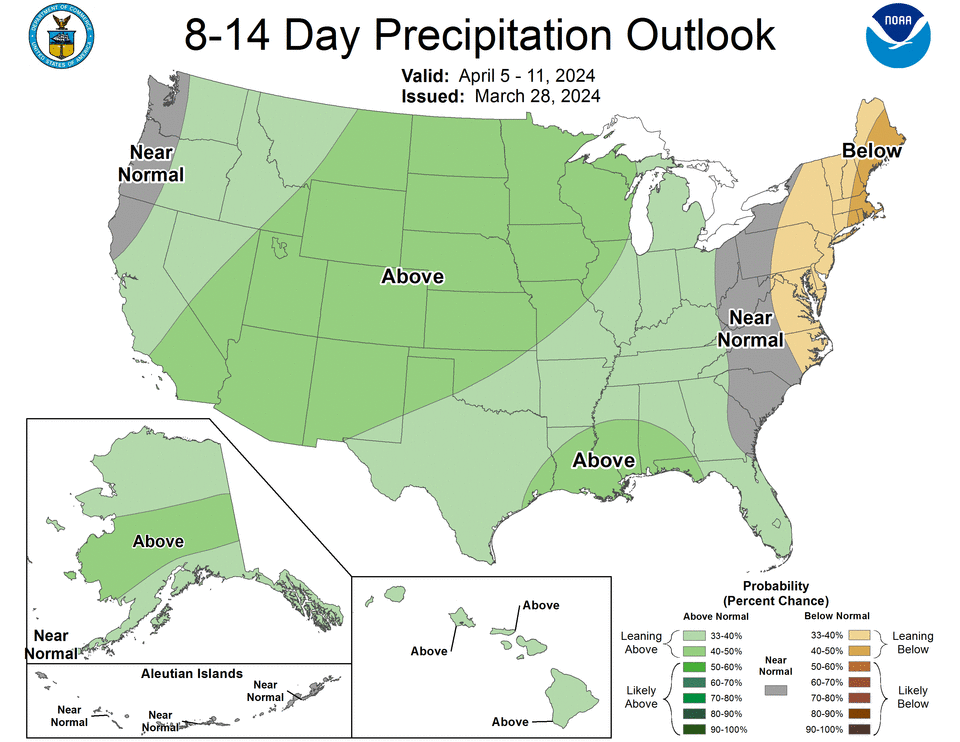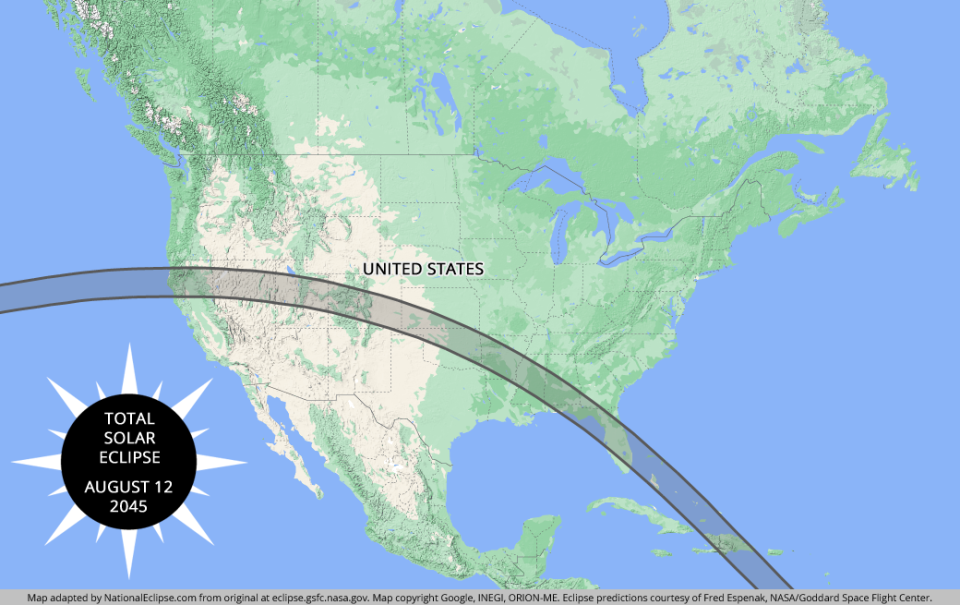Will rain or clouds block view of solar eclipse in Florida? Here's the long-range forecast
There's just over a week to go before the arrival of the anticipated 2024 solar eclipse.
We know when it'll be. We even know exactly what time to go outside to see the start of the eclipse and when the peak coverage will be on our area.
What's not as well known is what we'll actually be able to see. Will Mother Nature send clouds or rain to block our view? Will we have clear, blue skies for the best possible view of the partial eclipse we'll be able to see in Florida?
Florida isn't in the path of totality, but residents in the northern parts of the state will see the moon block more of the sun than those farther south.
Here's what early forecasts are predicting for the eclipse across Florida.
When is the solar eclipse?
The solar eclipse will take place April 8.
Rain chances above average across Florida week of solar eclipse

The eight- to 14-day precipitation outlook for Florida for April 5-11, which covers the day of the April 8 eclipse, is leaning toward above-normal chances for rain, according to NOAA.
Unfortunately, rain chances for the week are the highest — 40% to 50% — in the northwest portion of the state, which also happens to be where the moon will block most of the sun during the eclipse.
For the rest of Florida, rain chances during the week range from 33% to 40% above normal.
AccuWeather predicting mainly dry conditions, but clouds could block view of eclipse
AccuWeather is predicting mainly dry weather on April 8 across Florida, said Alyssa Glenny, a meteorologist with AccuWeather.
"The Panhandle looks to have mostly sunny skies during the day on April 8. The main obstacle to deal with will be cloud cover.
"Expect more clouds in Central, South and along the East Coast of Florida. The later in the day it is, the more clouds will pop up. That's typical for this time of year, with cumulus clouds popping up in the afternoon," Glenny said.
Temperatures on April 8 are forecast to be average for this time of year: in the mid 70s in the Panhandle and in the lower to mid 80s across South Florida.
National Weather Service Florida long-range forecasts for April 8 eclipse
Here are the early predictions from the National Weather Service, which as of March 29 go beyond its normal long-range forecasts. Bottom line, there's still a lot of uncertainty in the forecast and conditions can change quite a bit before April 8:
Northwest Florida: While the Storm Prediction Center is predicting an above-average chance for rain across Northwest Florida from April 5-11, the National Weather Service Mobile said a weather pattern that typically blocks rain may move into the area on April 8. There there is a potential for high-level cloudiness. Forecasts this far out, though, could see several changes.
Northeast Florida: There's a 33% to 40% chance for rain during the week of the eclipse, according to the National Weather Service, Jacksonville, citing the forecast from the Climate Prediction Center.
Central Florida: Some models show a potential for a system of high pressure over the area, which could lead to clear skies for good viewing, according to the National Weather Service Melbourne.
South Florida: Forecasters with the National Weather Service Miami also repeated the precipitation outlook of 33% to 40% chance for rain for the week of eclipse, adding there's too much uncertainty beyond seven days.
Southwest Florida: Looks like we'll be under some high pressure but there could be some clouds, especially later in the afternoon. Rain showers shouldn't be an issue, according to the National Weather Service Tampa Bay.
What will the solar eclipse look like in Florida?
Can't see our graphics? Click here to reload the page.
Countdown clock to 2024 solar eclipse
Path of 2024 total solar eclipse
In the United States, April's total solar eclipse will cross 13 states.
Texas, Oklahoma, Arkansas, Missouri, Illinois, Kentucky, Indiana, Ohio, Pennsylvania, New York, Vermont, New Hampshire and Maine, plus parts of Tennessee and Michigan, are all in the 115-mile-wide path of totality.
To see the exact path of totality, check out an interactive map created by French eclipse expert Xavier Jubier.
How much of the solar eclipse will be visible in Florida?
Florida is not in the path of totality for April's solar eclipse. That means the moon won't totally block the sun.
Depending on where you are in the Sunshine State, the moon will block anywhere from 54 percent to 82 percent of the sun. Residents in the northwest corner of the state will see more of the eclipse.
Pineville, in the northwestern tip of Florida's Panhandle, is the city in Florida where the greatest percentage of the sun will be covered during the eclipse, according to Eclipse2024.
At the midpoint of the eclipse, Pineville viewers will see 82.4 percent of the sun covered at 1:55 .m. CDT, closely followed by Bratt with 82.3 percent of the sun blocked by the moon.
➤ See exact times to go outside to see the eclipse across Florida
Florida will be in path of totality for 2045 solar eclipse

Even if the weather doesn't cooperate April 8, Florida residents will have another chance at seeing another solar eclipse and this time almost the entire state will be in the path of totality.
You just may have to wait awhile..
On Aug. 12, 2045, a total solar eclipse will be visible over almost all of Florida, according to NationalEclipse.com.
2045 solar eclipse and Florida: Mark your calendar! Florida in prime viewing area for a different total solar eclipse
States in the path of totality — where residents will see the moon completely block the sun — include not only Florida but also: California, Nevada, Utah, Colorado, New Mexico, Oklahoma, Kansas, Texas, Arkansas, Missouri, Mississippi, Louisiana, Alabama, and Georgia.
Contributors: Ramon Padilla, Katrina Zaiets, USA TODAY
This article originally appeared on Treasure Coast Newspapers: Solar eclipse: Florida weather forecast view of moon's path across sun

